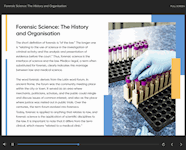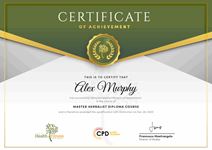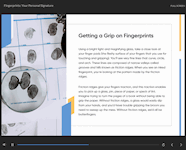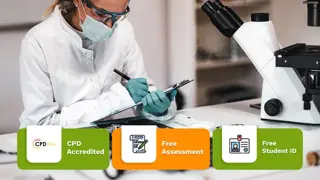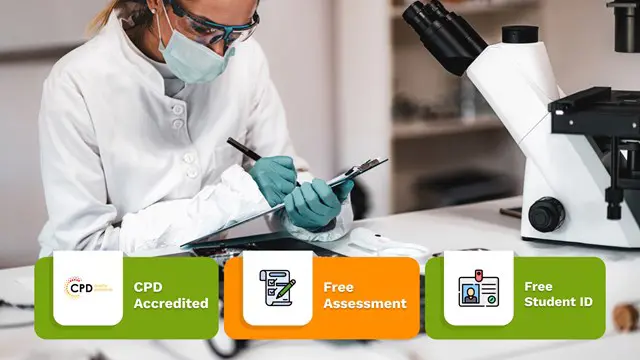
Forensic Scientist Masterclass
Winter Sale: Level 3! | CPDQS Accredited | Free ID Card & Assessment Included | Tutor Support | 11 Video Lessons
Academy for Health & Fitness
Summary
- Certificate Accredited by CPDQS - £10
- Certificate Accredited by CPDQS - £29
- Exam(s) / assessment(s) is included in price
- Tutor is available to students
Add to basket or enquire
Overview
☞☞ 24 Hours Left! Don't Let the Winter Deals Slip Away – Enrol Now!☚☚
In the Level 3 Forensic Scientist Course, you will delve into the fascinating world of crime scenes and learn how criminal investigations are conducted, taking you through each and every step. It includes a detailed overview of the history and development of forensic science, as well as an introduction to the first forensic scientists.
With this Level 3 Forensic Scientist course, you will develop the core skills required to fast-track your career, providing you with both a practical and theoretical understanding of the field of forensics. From analysing fingerprints to recording a crime scene and collecting physical evidence, our experienced instructor will walk you through the entire investigation process.
Key Topics to Be Covered by Level 3 Forensic Scientist
- The History and Development of Forensic Science
- An Introduction to the First Forensic Scientists
- An Overview of the Locard Exchange Principle
- Crime Lab Services & Biological Forensic Science Services
- The Role of the Coroner and Medical Examiner
- How to Conduct a Crime Scene Investigation
- Recording the Crime Scene and Essential Equipment
- Collecting and Packaging Physical Evidence
- Fingertip Evidence, DNA, Drug & Bloodstain Analysis
This Forensic Scientist online training course is accredited by CPDQS with 10 CPD points for professional development. Students can expect to complete this Forensic Scientist training course in around 07 hours. You’ll also get dedicated expert assistance from us to answer any queries you may have while studying our Forensic Scientist course.
Learning Outcomes of Level 3 Forensic Scientist
- Gain an in-depth understanding of the crime scene investigation process
- Deepen your knowledge of crime lab services & biological forensic science services
- Learn about the role and responsibilities of the coroner and medical examiner
- Understand the process for analysing DNA, drug, and bloodstain evidence
- Sharpen your logical thinking, analytical and investigative skills
- Know how to collect and package physical evidence taken from a crime scene
- Develop a comprehensive understanding of fingertip analysis and classification
- Gain an insight into the history of forensic science and how the industry has developed
CPD
Course media
Description
*** Course Curriculum ***
Here is the curriculum breakdown of this Forensic Scientist Masterclass course:
Module 1: Forensic Science: The History and Organisation
- The Development of Forensic Science
- The First Forensic Scientists
- The Locard Exchange Principle
- General Organisation of Forensic Science
- Crime Lab Services
- Biological Forensic Science Services
- Physical Forensic Science Services
- The Coroner and The Medical Examiner
- Duties of The Coroner or Medical Examiner
- The Forensic Scientist In The Courtroom
Module 2: Crime Scene Investigation
- Processing the Crime Scene
- Securing and Isolating The Crime Scene
- Recording The Crime Scene
- Photographic Procedures
- Video Recording
- Sketches
- Search Patterns
Module 3: Collecting and Packaging Physical Evidence
- Locating Physical Evidence
- Collecting And Packaging Physical Evidence
- Handling Evidence
- Packaging Evidence
- Biological Materials
- DNA Evidence
- Best Practices in Biological Evidence Packaging
- Maintaining The Chain of Custody
- Obtaining Standard/Reference Samples
- Submitting Evidence To The Laboratory
- Ensuring Crime Scene Safety
Module 4: Fingerprints: Your Personal Signature
- Getting a Grip on Fingerprints
- Developing The Science: A Trip Through Fingerprint History
- Using Ridge Patterns
- Making Matching Easier: Classifying Prints
- Developing the Henry System
- Locating Those Prints
- Seeking latent prints
- Powdering the print
- Using Chemistry To Expose Prints
- Cleaning up the Print: Digital Techniques
Module 5: Bloodstain Analysis
- Understanding Blood’s Character
- Looking into Blood Clotting
- Analysing Bloodstain Patterns
- Finding Clues in Passive Bloodstains
- Analysing Projected Blood Spatters
- Interpreting Void Patterns
- Classifying Projected Spatters
- Velocity Spatters
- Transfer patterns
- Reconstructing The Crime Scene from Bloodstains
- Putting It All Together: A Hypothetical Case
Module 6: DNA Analysis
- The Function and Structure Of DNA
- DNA Identification
- Collection And Preservation of DNA Evidence
- Preparing DNA Samples For Fingerprinting
- Steps of DNA Fingerprinting
- Paternity
- DNA Database in the UK
- Applications
Module 7: Drug Analysis
- Psychological Dependence
- Physical Dependence
- Societal Aspects Of Drug Use
- Types of Drugs
- Collection And Preservation Of Drug Evidence
- Forensic Drug Analysis
- Screening and Confirmation
- Colour Tests
- Microcrystalline Tests
- Chromatography
- Spectrophotometry
- Mass Spectrometry
Module 8: Firearms Examination
- Characteristics of Firearms
- Firearms Evidence
- Gunshot Residue (GSR) Analysis
- Collecting Firearms Evidence
- Handling of Firearms
- Cartridge Cases
- Test Firing
- Powder Pattern Examination
Module 9: Questioned Documents: Handwriting and Forgery Examination
- Handwriting
- Learning To Write
- Handwriting Comparison
- Forgery
- Disguised Writing
- Altered Documents
- Indented Writing
- Paper and Ink
- Typewriters and Photocopiers
Module 10: Digital Evidence
- Computer Seizure
- Steps to Remember
- Collecting Video Evidence
- Determine If There Is A Video
- Stop The Recorder
- Confiscate The Recording Medium Immediately
- Document the Video System’s Physical Relationship to the Crime Scene
- Seek Technical Assistance if Problems Occur
Module 11: Forensic Psychology: Delving into the Criminal Mind
- Defining the Role of the Forensic Psychiatric Professional
- Differentiating Forensic from Clinical Psychiatry
- How the Mind Matters In Forensics
- Assessing the Brain
- Getting Started With a Medical History and Physical Exam
- Digging into the Psyche
- Employing Dubious Techniques
- Dealing with Deception
- Debunking the Eyewitness
- Dealing with False Confessions
- Assessing Competency and Sanity
- Determining a Defendant’s Competence
- Tracking Serial Offenders
- Classifying the Multiple Murderer
- Profiling the Perpetrator
- Assessing The Perpetrator’s Psyche
- Distinguishing MO from signature
- Profiling the Victim: Victimology
- Drawing Boundaries: The Killer’s Domain
Assessment Process
Once you have completed the modules in the Level 3 Forensic Scientist course, your skills and knowledge will be tested with an automated multiple-choice assessment, after which you will receive instant results.
Who is this course for?
This Level 3 Forensic Scientist course is ideal for:
- Students and graduates of forensic science, criminology, or related fields
- Law enforcement professionals, detectives, and private investigators
- Anyone interested in pursuing a career in forensic science or criminal justice
Requirements
You will not need any prior background or expertise. All you need to take this Level 3 Forensic Scientist course is —
- A smart device.
- A secure internet connection.
- Being over the age of 16.
- And a strong drive for learning and literacy.
Career path
The Forensic Scientist: Masterclass is perfect for aspiring professionals who want to quickly advance their careers in this industry by acquiring the necessary abilities. The following opportunities exist in the field of forensic science:
- Forensic Scientist: £18,000 to £45,000 per year
- Crime Scene Investigator: £16,000 to £37,000 per year
- Fingerprint Expert: £18,000 to £30,000 per year
Questions and answers
Currently there are no Q&As for this course. Be the first to ask a question.
Certificates
Certificate Accredited by CPDQS
Digital certificate - £10
Certificate Accredited by CPDQS
Hard copy certificate - £29
If you are an international student, then you have to pay an additional 10 GBP as an international delivery charge.
Reviews
Currently there are no reviews for this course. Be the first to leave a review.
Legal information
This course is advertised on reed.co.uk by the Course Provider, whose terms and conditions apply. Purchases are made directly from the Course Provider, and as such, content and materials are supplied by the Course Provider directly. Reed is acting as agent and not reseller in relation to this course. Reed's only responsibility is to facilitate your payment for the course. It is your responsibility to review and agree to the Course Provider's terms and conditions and satisfy yourself as to the suitability of the course you intend to purchase. Reed will not have any responsibility for the content of the course and/or associated materials.
